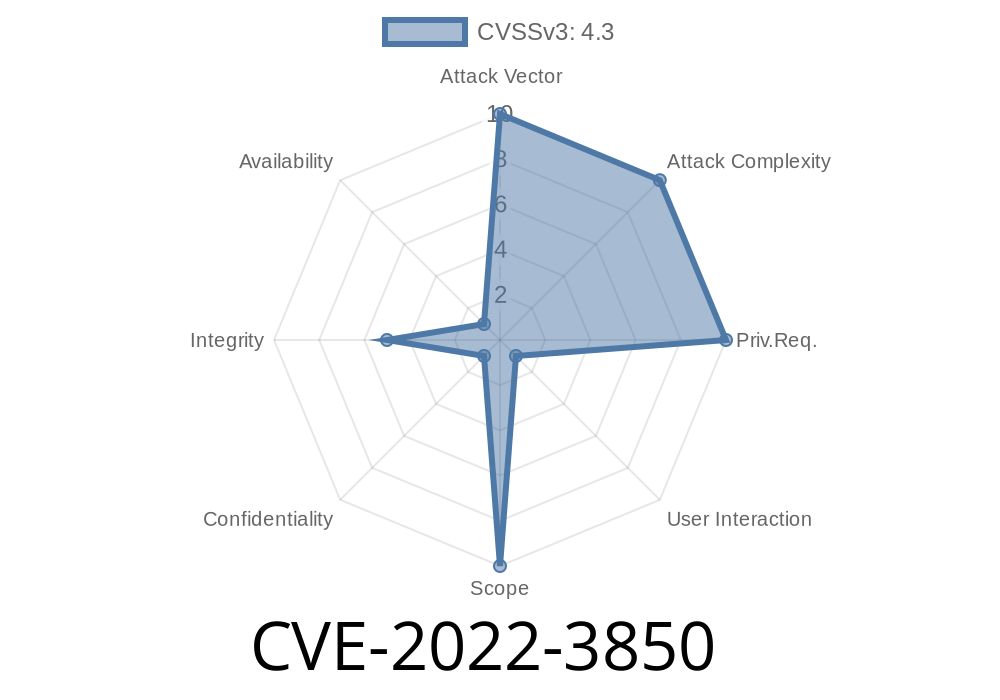Security is a crucial aspect of today's web, and WordPress is no exception. Recently, a major vulnerability (CVE-2022-3850) was discovered in the Find and Replace All WordPress plugin (prior to version 1.3). This article aims to break down the issue, explain how attackers could exploit the vulnerability through Cross-Site Request Forgery (CSRF) attacks, and what developers and users should do to stay protected.
Vulnerability Details
CVE-2022-3850 pertains to a CSRF vulnerability in the Find and Replace All WordPress plugin (before version 1.3). The plugin is designed to help you search and replace strings in your database, which is particularly useful for large-scale website updates. However, this vulnerability presents a serious risk for websites using versions older than 1.3 of the plugin.
A CSRF attack allows an attacker to perform unauthorized actions on a user's behalf by tricking them into clicking a malicious link or submitting a form that contains the attack. In the case of the Find and Replace All plugin, a logged-in admin can be tricked into replacing arbitrary strings in the database tables without their consent.
Exploit Description
The vulnerability comes from a lack of a CSRF check when replacing strings. Attackers can include malicious code in the string replacement operations, potentially altering the content of database tables and causing severe consequences for the affected site.
For example, an attacker might create a form that initiates a string replacement command. This form could be hosted on a different site or sent via email, causing any admin who interacts with it to inadvertently replace valuable content without realizing it.
Code Snippet
<form action="http://www.example.com/wp-admin/tools.php?page=find_replace"; method="POST">
<input type="hidden" name="f_text" value="Target String">
<input type="hidden" name="r_text" value="Malicious String">
<input type="hidden" name="submit" value="Replace">
<input type="submit" value="Click Me">
</form>
In the above example, the attacker would replace the "Target String" with the intended victim string, and "Malicious String" with the desired replacement. When an unsuspecting admin clicks the "Click Me" button, it would execute the string replacement without any CSRF check, potentially altering important data.
Original References
The vulnerability was first reported by the National Vulnerability Database (NVD). More details on the CVE-2022-3850 vulnerability can be found in the NVD's entry for the issue:
- NVD - CVE-2022-3850
Mitigation and Protection
To protect your website from this vulnerability, it is crucial to update the Find and Replace All plugin to the latest version (1.3 or newer). This update includes the necessary CSRF checks to prevent unauthorized string replacements.
As a general security practice, it is essential to keep all your WordPress themes, plugins, and the WordPress core updated to the latest versions. This helps prevent attackers from exploiting known vulnerabilities to gain unauthorized access or manipulate your site's content.
In addition, always be cautious about clicking on suspicious links or submitting forms from untrusted sources. Make it a habit to verify the integrity of any code or forms before interacting with them.
Conclusion
The CSRF vulnerability (CVE-2022-3850) found in the Find and Replace All WordPress plugin before version 1.3 emphasizes the importance of continuous security reviews and updates for web applications. By following security best practices and keeping your software up-to-date, you can significantly reduce the risk of your website being compromised.
Timeline
Published on: 11/28/2022 14:15:00 UTC
Last modified on: 11/30/2022 03:52:00 UTC
